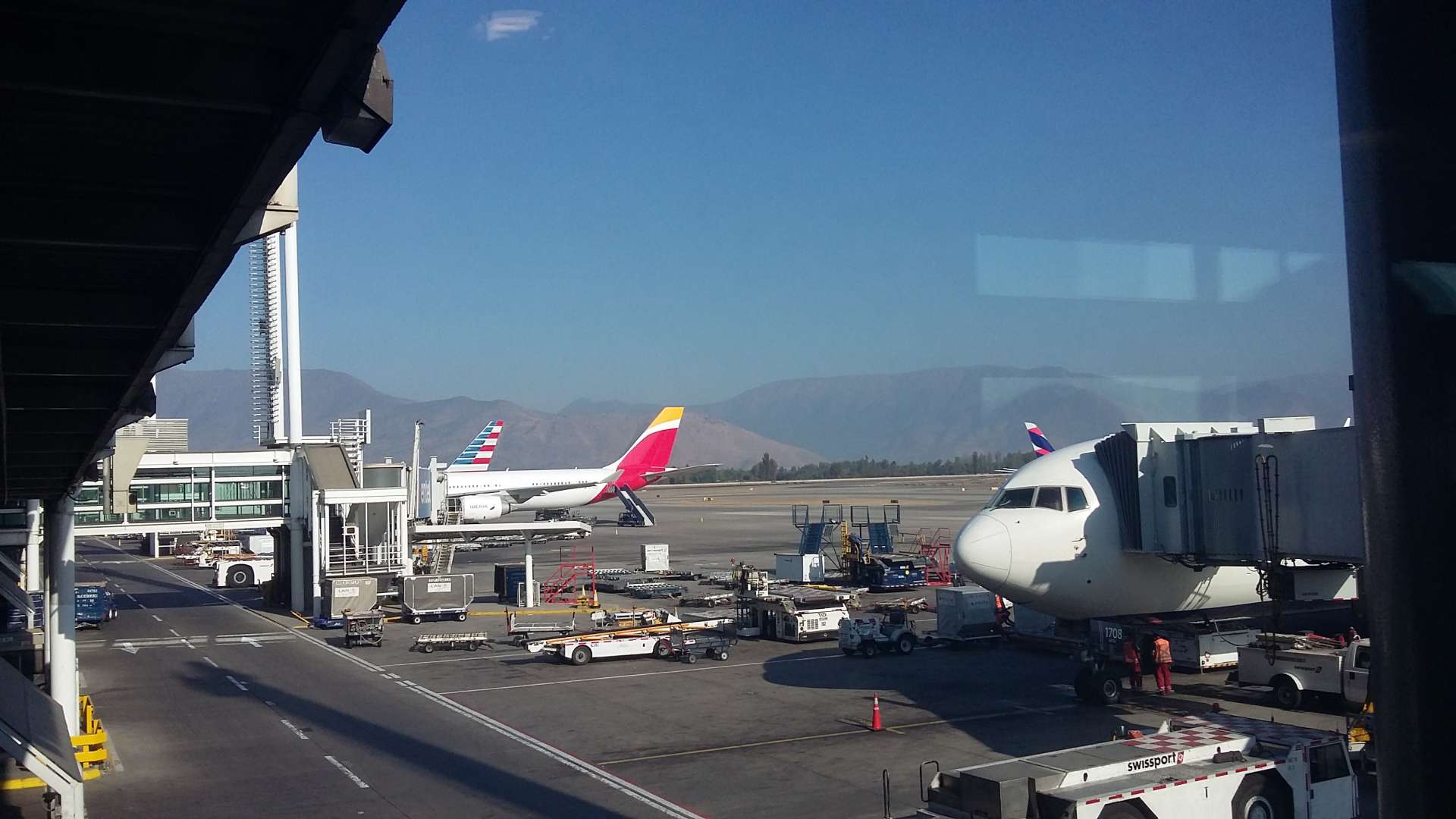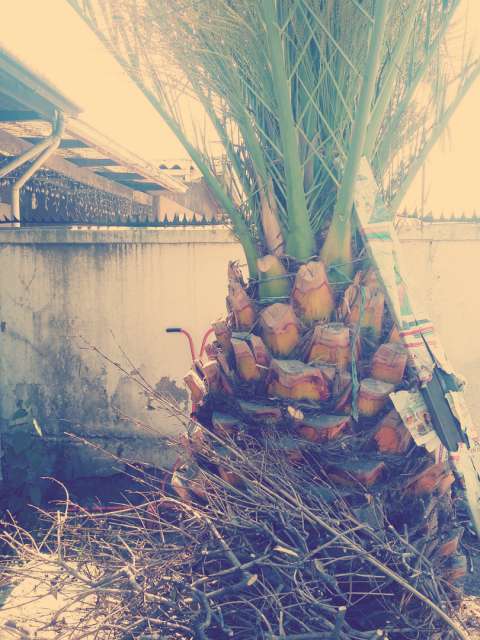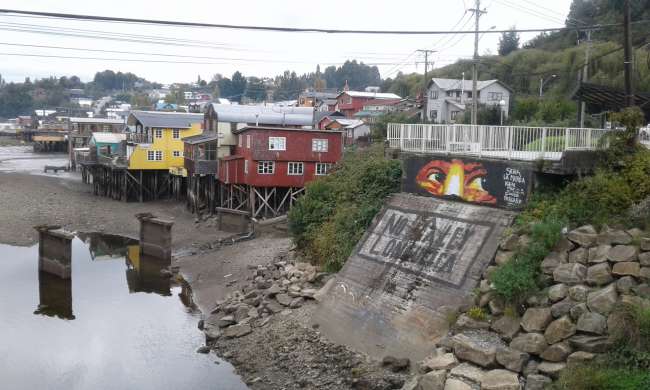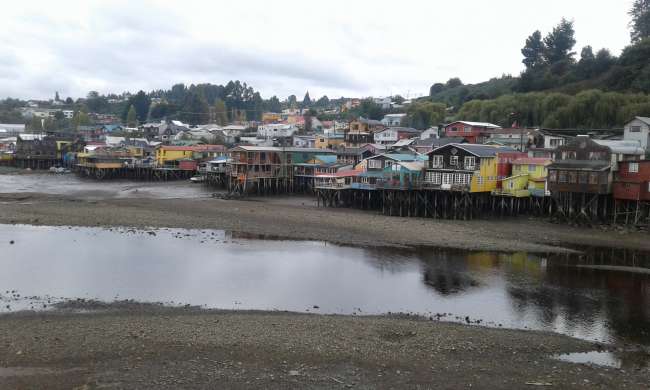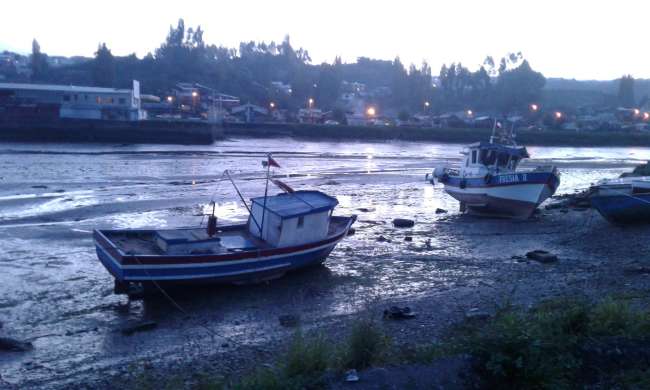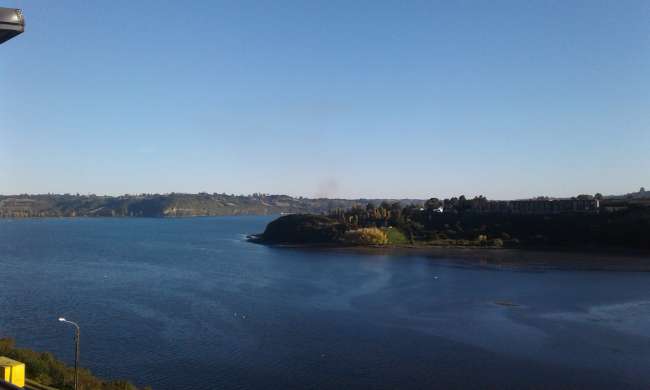Review: La Minga Hostel in Castro
የታተመ: 12.04.2017
ለጋዜጣ ይመዝገቡ
At first, I was just completely exhausted. After the 17-hour journey and the stolen phone incident. Catalina opened the door for me. She is the sister-in-law of the owner and took care of the hostel for three weeks while Camila and her husband were on vacation. I had also communicated with Camila. Through the Workaway internet platform, I had inquired about working at her hostel 'La Minga' in Castro for two weeks. In return, I was allowed to stay and have breakfast there. Castro is 1,200 km south of Santiago de Chile and is the capital of Chiloé Island. Many people have raved about the beauty of the island, so it suited me well as the first stop after my month in Santiago. I arrived there on March 31.
Cata seemed a bit reserved to me, she explained everything about the work to me, but I asked her to stick to Spanish. However, she didn't have much patience and soon switched to English, which was very frustrating for me. It wasn't until after a few days, after I had demonstratively had a phone call with Béné in her presence in Spanish, that she asked me to check in with a Chilean guest. From then on, she mostly stuck to Spanish. And if not, I had gotten used to answering in Spanish when she said something in English. Then she would switch too.
So on the first day, I felt very lost. I was incredibly tired and felt humiliated and betrayed by the phone theft. As if I had failed and been publicly exposed. I also wondered what was so great about traveling if it makes you feel like this. But I also thought a lot about whether it was just meant to be with the phone. I had prepared so much for all possible eventualities. But I hadn't really expected my phone to be lost. I hadn't even put a keypad lock on it. Stupid, I know, but that's how it was. Besides the fear that someone might do something stupid with my data on the phone, I realized how incredibly fixated I was on this device. I had really built a relationship with it, and now I felt the loss. It was also a retreat, so familiar, everything tailored to me. I had wasted so many sleep-deprived hours before. Clicking on something without really wanting to. Too weak to just put it aside. So losing it painfully taught me to let go.
And once again, learn to listen to my intuition. By the way, we're already dealing with the topic of politeness. Although I had a strange feeling on the subway, deep down (unconsciously), I still thought it would be impolite to assume that someone who had just helped me would now steal something from me.
In the evening, Cata kindly went with me to look for a new phone. Then she also opened up a bit and we were able to have a nice conversation in Spanish. Luckily, she was there because it's not that easy. Most phones (especially the cheap ones) only work within Chile. I probably wouldn't have understood that if she hadn't accompanied me. Since it was late in the evening and the stores we went to didn't have a suitable phone, we postponed the purchase until Monday. Until then, she let me use the hostel's phone, which was very kind and helpful. This way, I could communicate with my family back home to let them know I arrived safely and why I wasn't replying. I also asked my parents to find out what I could do to lock the phone somehow. The Movistar Shop, which is my Chilean SIM card provider, was already closed and the call to the number was also unsuccessful.
Additionally, I had an alarm clock through the hostel phone because the next morning we started work at 8 am.
In the evening, a woman from North Korea offered me wine as she sympathized with me about the stolen phone. That felt good, and I felt even more at home when a Taiwanese guy shared his mussels with us. Only my stomach didn't like that combination very much, which kept me awake all night.
On Saturday, Cata showed us everything about getting bread, making breakfast, and taking care of the check-outs until 11 am. Afterwards, we made the beds together, which you really have to learn first. Typically Mediterranean, all beds have a regular sheet, then a thin blanket, then a wool blanket. On top of these, a large duvet is placed, and a wool blanket is added to the foot end, which can also be used if necessary (and the need was great because winter was coming). You have to drape everything smoothly and tuck any excess blankets under the mattress. It gets quite warm over time.
The working hours for volunteers at the hostel are 5 hours a day, 5 days a week. In the morning, it involves making breakfast, cleaning up, making beds, and if there's time, cleaning the floors. In the evening, you have to be there from 7 pm, mainly to check in guests, take their information, show them around the hostel, and explain everything. Plus, folding the bed linens. Then at midnight, it's quiet time, and it's time to clean the kitchen, bathrooms, and floors in the common area and kitchen, refill toilet paper, and change towels. Oh, and of course, take out the trash. Because here, you can't flush toilet paper, as the pipes can't handle it.
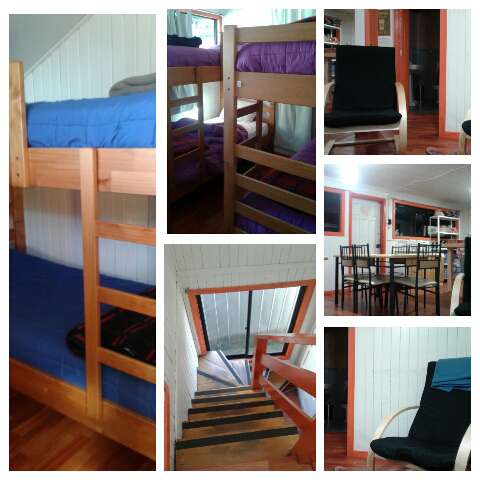
So on Sunday, another volunteer arrived from Workaway, Emily. She's also German, which didn't necessarily help my foreign language skills, but it did give me a little more sense of home. And that came in handy with the phone incident, as her phone was also stolen from the car during an outing. Someone had prevented the car from locking properly. So she could understand me perfectly and even accompanied me to the Movistar store (telecommunications provider) on Monday to block my Chilean SIM card and get a new one. I even got it for free, with the same number, and my balance was still there! I slowly realized that I wasn't the first person this had happened to and that everyone was prepared for it. So it was no problem to block my Gmail account on my old phone, etc. It's just that at the beginning, it felt like I was the only one in the world who had experienced something so unpleasant and that everyone was looking at me shaking their heads.
Afterwards, we went to the larger electronics store where I had briefly looked on Saturday. There was a suitable phone for me, which I had fortunately already chosen and checked online. However, this time we were advised by a rather incompetent but entertaining salesman. If I had had some customer card, I would have gotten a discount, he said, but he couldn't seem to accept that I didn't have one :D
Back at the hostel, I was able to set up my new phone. And here, my well-thought-out preparation paid off again because the new phone only took micro SIM cards, not the even smaller nano cards like my old phone, which my German SIM card was cut for. But I had intelligently brought SIM card adapters, so I was able to easily activate my WhatsApp on my German number again.
Otherwise, I had a really great time at the hostel. It felt good to have a task. I already knew that I simply need such work from time to time as a sense of purpose. Two weeks of regularity and structure were really nice. Not having to think about how to plan the day because half of it is already planned. I also noticed how working as an assistant director in the theater has trained my eye for what needs to be done. But it took me a while to get used to the fact that I don't have to be perfect for my work to be perfectly fine. And that it's really okay to stop after 5 hours. I'm used to being responsible for everything that needs to be done in the theater, no matter how late it is or how long I've been working. So it was a valuable experience. Also, Cata was never accusatory if something didn't go as planned, which was really good. One morning, she had to come early because we couldn't get the gas to work. Of course, it worked for her right away. I was so scared that she would be angry or annoyed, which turned out to be completely unfounded.
Regarding the shifts, we were lucky that Cata was there as a substitute because she assigned us alternating morning and evening shifts. Camila usually handles it so that the volunteers keep one shift all the time. I would have found that a shame because both shifts have their advantages. Checking in guests in the evening is fun (I would have missed that with Camila because Emily speaks better Spanish and would have gotten the evening shift). But I also think it's incredibly nice to be the very first awake in the morning (which rarely happens to me normally :D), to prepare everything and go to the bakery in the great morning atmosphere of the first rays of sunshine.
One of the two days off during the week, Cata arranged for Emily and me to have the same day off. On the first Thursday, we went on an excursion to Muelle de las Almas (see older post) together, and on the following Thursday, April 13, Emily and I went to the Chiloé National Park. We had been there the week before, unaware of the distance, and walked to Muelle. Now we made up for the park.
We could tell the story of our 6-hour hike instead of 40 minutes several times when guests asked us about excursion options. It was helpful that no one else had the same experience, and it was always entertaining.
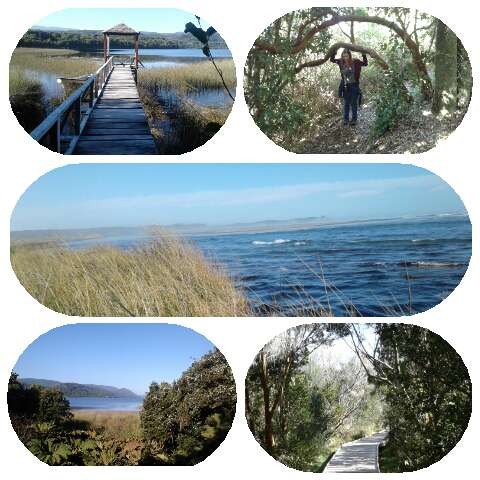
So we took the bus to Cucao and from there we walked to the beach on the Pacific coast. It was nice to be by the sea, with a pleasant breeze, we took our daily nap. Not entirely intentional, but cozy. After our picnic (we had learned from the previous trip to bring something!), sleep came naturally.
There was also a second route to the lake that we skipped by just walking to a bridge with a great view of the lake.
The afternoon nap had become a habit for us. We had a room all to ourselves, which unfortunately had no window, but it was our own cozy, chaotic kingdom.

Whenever one of us finished the morning shift, she would lie down, and the other, who hadn't been very busy in the morning, would soon join in :D
Only on my other day off, I was productive and went jogging twice!
Unfortunately, I was unsuccessful in finding a path directly by the sea. In Germany, there would be at least 2 promenades and one bicycle path in this beautiful area. Here, I came across houses, fences, and sometimes very aggressive dogs, which quickly drove me away from some side streets and startled me with loud barking from the gardens. I had never been afraid of dogs, but in Castro, I really developed a fear.
The dogs here are so different from the stray dogs in Santiago. They were all peaceful and would politely make way for you if necessary.
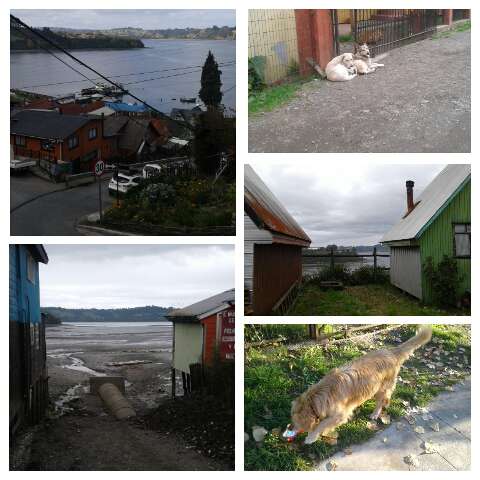
The main attraction of Castro is the 'Palafitos,' stilt houses along the coast. I find it a bit questionable that they are the main attraction because the people who live there are often poor. Cold air blows in from below, and I've been told that they often don't have electricity or running water. Being a tourist attraction doesn't benefit them at all because no one pays them to take a picture of their houses. Additionally, many of these stilt houses were destroyed by the earthquake and subsequent tsunami in 1960 (thanks to Wikipedia for the info).
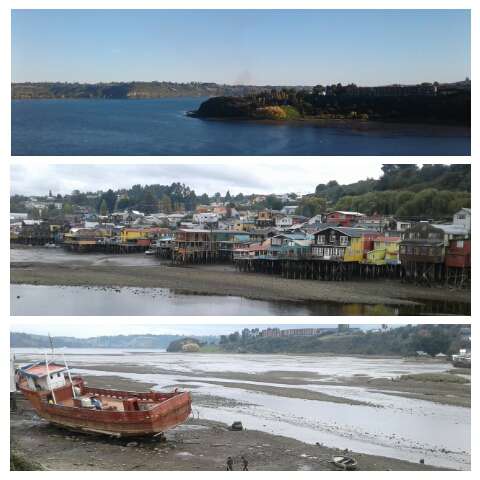
One day, when I went jogging on my day off, I went to the other side to see the houses there. I arrived in the evening, which gave me beautiful pictures, but also made the suddenly appearing dogs even more eerie. On the way back, I had to take a detour through three very busy streets because the sidewalk I had come on passed by a house where a dog found that it should be his way now.
On the last few meters, I suddenly noticed another dog running next to me and looking at me excitedly as if to say 'Yay, where are we running to??' When I stopped in shock, he also stopped, looked at me bewildered, and apparently took it out on himself by throwing himself into the street in a half-suicidal attempt to chase after a car. Then he rushed towards me from behind at full speed. I turned around energetically, afraid of being bitten, and he stopped, then walked alongside me as if it were the most natural thing. Somehow cute. When I told him reluctantly at the next street that this was not possible, that he had to leave, he actually stopped and just watched me as I walked away.

Being here, safety is not a concern. People may appear poorer than elsewhere, but they are peaceful and calm. Everything seems a bit sleepy, and unlike Santiago, the windows are not secured with bars, showing that there is no risk of break-ins.
Emily and I got along great together. We have the same sense of humor and the same coziness. Since we were allowed to take some of the breakfast items for the rest of the day, we regularly sat by the stove in the hallway (the only warm place in the house) and ate cereal :D
When the stove was on, it got really warm on the upper floor (where fortunately our room was), but the warmth dissipated as soon as it was turned off, and the other rooms always remained cold. It was so absurd to say 'I'm now going from Santiago to the south, where it's cold' because for us, the south always means that it's warmer there. But now I'm on the southern hemisphere, and it's winter. During my whole month in Santiago, I only had one rainy day. It rained a lot in Castro, and it was already very cold. I missed my gloves.
We made "my" chocolate cake once. Since all the shopkeepers looked at you perplexed when you asked for ground almonds, we chopped them ourselves. That also contributed to the entertainment of the other guests.
...oh, and do you know what goes great with chocolate cake? A touch of Dulce de Leche. At first, I thought, 'nah, that can't be good, too sweet together'.. but Emily tried it, and so I let myself be convinced.
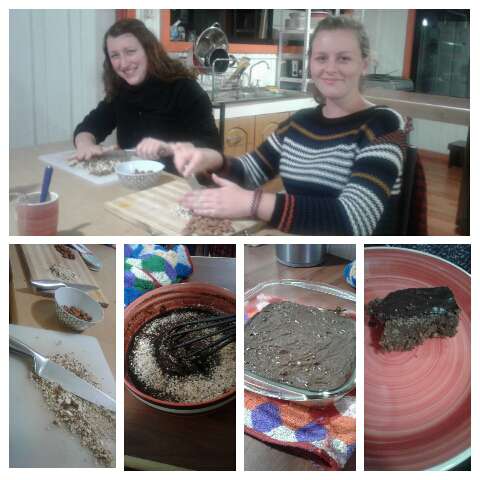
Even more exciting than the food was analyzing the people together. In every group of guests, there is ALWAYS someone who has to dominate the conversation and can be annoyingly loud. I have observed this in all hostels so far. Quite the opposite, we named one guest 'The one who never says anything' because we knew absolutely nothing about him. In the end, he turned out to be an American, whom I ironically met again on the bus from Puerto Varas to Bariloche.
A German guy was one of the central people. At first, I thought he was a bit shy, but he simply came to life when he could show off all his knowledge in a group. But he couldn't listen, he only wanted to be right.
There were mostly French people, who gathered for their games, once a wave of Americans, and in the last few days before I left, more and more Germans. It was like waves of nationalities coming in. Unfortunately, there were very few Spanish speakers. But I met Micaela from Argentina again in Puerto Varas.
With a quieter French guy who also stayed for several days, I practiced speaking Spanish because he wasn't very confident either. It's usually quite pleasant because both have patience with each other. Another great Chilean complemented our efforts during breakfast and was a good teacher, helping us with many expressions. He came from not too far away, from Quellon, which is on the same island. He raved about how I should actually go there too because it's so beautiful. There is no real bus connection, but you can hitchhike from village to village. I really wanted to try that. I've heard from several people that the south of Chile and Argentina, Patagonia, is safe for hitchhiking. But since I've never hitchhiked alone and didn't feel confident enough in my Spanish to handle the communication, I abandoned this plan.
What remained was the feeling of missing out on something great. This feeling is my constant companion. On the one hand, I know that I can't constantly experience something new for a whole year and that I sometimes need time for myself and to process everything. But when I'm in a place where I could calm down, I can't enjoy it because the thought that I could be experiencing who knows what but I'm not doing it overwhelms me. But there was always something going on at the hostel, and the people there were interesting.
Then there was also the Taiwanese guy who offered me his mussels on the first evening and soon became part of the hostel community. While most people stayed for only one or two nights (which was often a shame), he stayed for almost a week, and something was missing when he left. Since he felt that he had already done enough sightseeing in the past months of traveling, he mostly stayed in the common area instead of going on over-enthusiastic trips. And he drank at least 1.5 bottles of wine every day, which we couldn't believe. But he never seemed drunk. Just talkative. I preferred the quiet ones because deeper conversations were often possible with them. So I got along great with the Dutch couples and a French girl who also wrote a blog and was weeks behind in her diary. We could understand each other and motivate each other to write.
And then there was this funny Turkish guy. He arrived in the middle of the night and wanted to go out to eat first. When he came back, we asked if he found something. His answer was 'no, but something much better' and he pulled out a bottle of Pisco, which he shared with everyone.
He sent me a link on WhatsApp to a man who had been cycling around the world for years and whom he would meet somewhere in Chile. In response to my smiley reaction, he sent me a live presentation of these smileys, and I had to laugh so hard that I have to show it to you too:

He even used a Mickey Mouse background for our chat haha :P
And if you've ever played The Sims, you'll love this picture of him from Instagram:
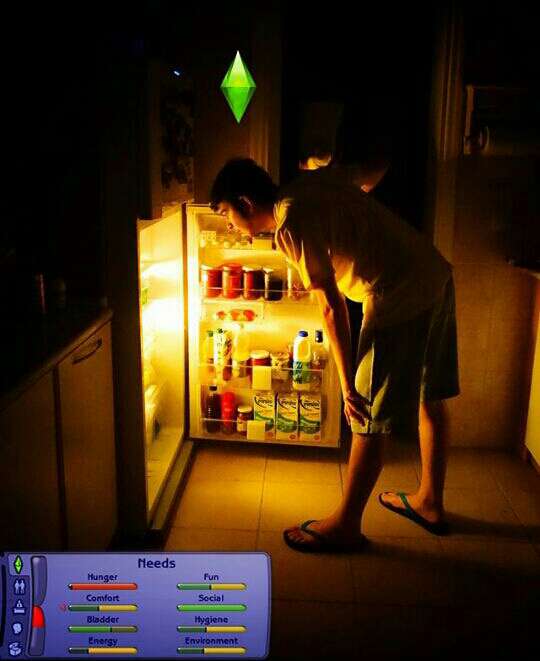
It sounds derogatory to say 'the Turkish guy,' but that's only because it has a negative connotation for us. For simplicity's sake, Emily and I referred to everyone by their nationalities. We couldn't pronounce or remember many names, so we always knew who was meant without it having a negative connotation. It's crazy how we ruin words like that...
Eventually, I didn't feel like getting to know someone new anymore. The constant turnover of so many people eventually annoyed me. Just when you had met someone nice, they were gone. Plus, I learned that I don't always have to talk to everyone. If I meet someone in Germany who has traveled, it's like 'wow, that's so interesting, tell me!' But here, everyone is traveling, and there are also different types of people. Sometimes I felt lonely and like I didn't belong when I was in the common area because I had the evening shift, and a group had gathered at the table having fun. But when I actually considered whether I really wanted to be in the middle of it right now, I often realized that it would have been too loud for me, one person too dominant, or the topics incredibly superficial. It's more of a reflex like 'oh, someone is having fun, I have to too..'. Again, the feeling of missing out. Hostels are a good exercise in learning when it's the right time for me to socialize and when it's time to retreat. Because if I want, I can always find someone to talk to or sit down next to. We're no longer in school, where secluded cliques form and you really have to worry about not belonging. That fear is still too deeply ingrained in me. But the people who really fit me usually find me on their own. And usually not in the middle of a loud crowd, but rather on the outskirts. That's where the French girl was when she wrote in her diary. And I had Emily as my constant.
As great as all the new acquaintances are, I learn to appreciate my friends at home even more. It's just nice to know that there's someone who knows the whole backstory when I tell something.
And eventually, it was just enough to constantly have so many people around. And especially to always hear English. That's when couch surfing in Argentina came in handy.
The last two days, Camila was back. It was a bit awkward at first for all of us, but she is incredibly nice. You can tell that she really loves working at her hostel and her heart is so big that all the guests fit in there.
She also helped me when I wanted to buy my ticket for Easter Sunday to Puerto Varas and was told at the counter that there were no buses going there. The service here is no joke, most of the clerks are not at all interested in helping you. They just say 'it's not possible' without suggesting any alternatives. But Camila knew that buses had to go to Puerto Montt, and from there, I could take a small bus to Puerto Varas, which runs every few minutes. And that's how it was. But without her, I wouldn't have found out. So you always have to look for alternatives yourself, parallel to the information you get at some counters, and ask persistently enough.
Finally, here's a picture of the church in Castro, so as not to completely neglect sightseeing:

I went inside once out of duty, but I was pleasantly surprised at how beautiful it is inside too! All wood and therefore very bright. It's called Iglesia de San Francisco and in 2000, it was even included in the UNESCO World Heritage along with the other wooden churches on the island. Interesting.
ለጋዜጣ ይመዝገቡ
መልስ
